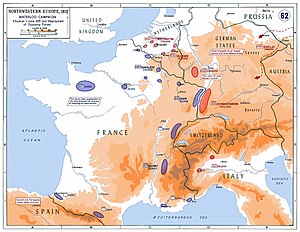Minor campaigns of 1815
| Minor campaigns of 1815 | |||||||
|---|---|---|---|---|---|---|---|
| Part of the War of the Seventh Coalition | |||||||
 Strategic situation in Western Europe in June 1815 |
|||||||
|
|||||||
| Belligerents | |||||||
|
|
Seventh Coalition: |
||||||
| Commanders and leaders | |||||||
|
|
von Hake |
||||||
![]() Jean Rapp (Armée du Rhin)
Jean Rapp (Armée du Rhin)![]() Suchet, Duc d'Albuféra (Armée des Alpes)
Suchet, Duc d'Albuféra (Armée des Alpes)![]() Claude Lecourbe (Armée du Jura)
Claude Lecourbe (Armée du Jura)![]() Guillaume Brune Armée du Var
Guillaume Brune Armée du Var
On 1 March 1815 Napoleon Bonaparte escaped from his imprisonment on the isle of Elba, and launched a bid to recover his empire. A confederation of European powers pledged to stop him. During the period known as the Hundred Days Napoleon chose to confront the armies of Prince Blücher and the Duke of Wellington in what has become known as the Waterloo Campaign. He was decisively defeated by the two allied armies at the Battle of Waterloo, which then marched on Paris forcing Napoleon to abdicate for the second time. However Russia, Austria and some of the minor German states also fielded armies against him and all of them also invaded France. Of these other armies the ones engaged in the largest campaigns and saw the most fighting were two Austrian armies: The Army of the Upper Rhine and the Army of Italy.
...
Wikipedia
